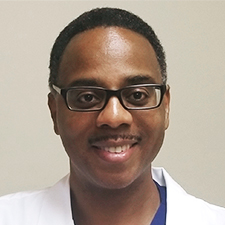Respiratory Therapy
Leadership insights about COVID, nursing collaboration and the future of the profession.
Originally called “inhalation therapy”, the respiratory therapy specialty didn’t emerge until the mid-1940’s. From there, it was several decades before licensing and credentialing was put in place.
Jerry Wright, Director of Respiratory Care Services at Memorial Regional Hospital, remembers when ventilators were yet computerized, at the very beginning of his career in mid-1980’s. Nor were there disposable supplies. Equipment had to be cleaned, sterilized and reassembled and packaged.
“Everything today is so much easier,” he says. “There’s a lot more attention to quality and safety. Plus, there is much more team integration and respect for respiratory therapists as highly educated professionals with very specialized skills. We’re heavily relied on here within Memorial Healthcare System, especially now during COVID.”
Interdisciplinary collaboration thrives here.
“Our nurses have, and have always had, respect for our expertise. We’re working together so intently now, focusing on our COVID patients,” Wright continues. “We have seen many patients suffer and pass away due to this relentless virus. But we support each other through these extremely emotional times. This has definitely brought nursing and respiratory closer together. When we have debriefing sessions to talk about what is happening, and what’s working well, respiratory and nursing are in the same room together. This has truly enhanced the team.”
Wright’s colleague Bryan Leatherwood, Director of Respiratory and Specialty Services at Memorial Hospital West, agrees. “The relationship with nursing has only grown stronger. We communicate like never before. We’ve always had a good relationship, but now that we have to rely on each other more, the bond has just grown stronger. COVID has brought us closer as a team. It’s a silver lining of the pandemic.”
Supporting our respiratory therapists.
 Leaders like Wright and Leatherwood are doing what they can to reward their teams during these difficult times. Therapists receive a generous bonus for working extra shifts, along with a program that offers a completion bonus if they commit to four days per week, for 12 weeks. That’s in addition to the shift bonus and a recent wage increase. Referral bonuses are also available to team members who successfully refer qualified respiratory therapists.
Leaders like Wright and Leatherwood are doing what they can to reward their teams during these difficult times. Therapists receive a generous bonus for working extra shifts, along with a program that offers a completion bonus if they commit to four days per week, for 12 weeks. That’s in addition to the shift bonus and a recent wage increase. Referral bonuses are also available to team members who successfully refer qualified respiratory therapists.
“We are also bringing in travelers to support the workload when needed,” says Leatherwood. “We’ve gotten some very good people who have assimilated into our team and are very much into caring about our patients. We’re also trying to help respiratory therapists take some time to decompress. Providing lunch, dinner, an ice cream social or whatever. To help take their minds off the immediate urgency of the situation. Just a little bit of a break in between.”
“And there are no concerns about safety at Memorial,” adds Wright. “Our respiratory therapists never have to worry about running out of PPE or anything like that. Safety is first and foremost here.”
Looking ahead to tomorrow.
Another challenge facing respiratory leaders is that the next graduating class of students will not have had the traditional clinical education, due to COVID. They will come into the job market without ever having practiced their knowledge in a hospital setting. “This is going to be interesting,” muses Leatherwood. “It’s going to put our orientation and in-house education programs to the test. We’ll have to change the way we normally interact with new therapists.”
“I’ve been elected to the Florida Society of Respiratory Care, as the Regional Director for Broward County,” he continues. “Memorial is on the forefront of healthcare in Florida and nationally. So, it’s important that we are represented. One of the things we are talking about in Society meetings is what do we need to do to have students come back into the work environment. Some states are opening up licensure to students to allow them into the clinical setting. We’ll see if those types of changes start taking place in Florida.”
Memorial as a career destination.
Graduating therapists will continue to have opportunities despite COVID, but it is the experienced respiratory therapists that are in extremely high demand. They can go anywhere to grow their careers, so why choose Memorial?
“It’s our culture,” states Wright. “Our culture is like being part of a family, caring for each other. We also have great benefits, quite a bit of autonomy, and can work at the top of our license. We’re an excellent organization and a lot of that is because of the team. We meet with our therapists regularly and ask what’s working well, what we can do better. And 98% of the time, therapists say that they love their team. That everyone is helpful and encouraging. We nurture each other, stick together and have one another’s back. They all know their stuff and will jump in to help however they can.”
“I agree,” says Leatherwood. “You will love the family here. You will also have opportunities to learn. We will continue to train you. Since we are a System, you can go to different clinical sites. If you want to see what it’s like work with children, for example, you can pick up shifts at Joe DiMaggio Children’s Hospital. You will be able to explore your curiosity and grow throughout the System when you come on board here.”
Now is the time.
With respiratory in the spotlight, this is an excellent time to put your own career front and center. Learn more about our opportunities now.





